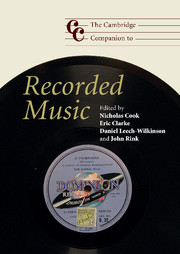Book contents
- Frontmatter
- Introduction
- Learning to live with recording
- A short take in praise of long takes
- 1 Performing for (and against) the microphone
- Producing a credible vocal
- ‘It could have happened’: The evolution of music construction
- 2 Recording practices and the role of the producer
- Still small voices
- Broadening horizons: ‘Performance’ in the studio
- 3 Getting sounds: The art of sound engineering
- Limitations and creativity in recording and performance
- Records and recordings in post-punk England, 1978–80
- 4 The politics of the recording studio: A case study from South Africa
- From Lanza to Lassus
- 5 From wind-up to iPod: Techno-cultures of listening
- A matter of circumstance: On experiencing recordings
- 6 Selling sounds: Recordings and the record business
- Revisiting concert life in the mid-century: The survival of acetate discs
- 7 The development of recording technologies
- Raiders of the lost archive
- The original cast recording of West Side Story
- 8 The recorded document: Interpretation and discography
- One man's approach to remastering
- Technology, the studio, music
- Reminder: A recording is not a performance
- 9 Methods for analysing recordings
- 10 Recordings and histories of performance style
- Recreating history: A clarinettist's retrospective
- 11 Going critical: Writing about recordings
- Something in the air
- Afterword: Recording: From reproduction to representation to remediation
- Notes
- Bibliography
- Discography
- Index
2 - Recording practices and the role of the producer
Published online by Cambridge University Press: 28 September 2011
- Frontmatter
- Introduction
- Learning to live with recording
- A short take in praise of long takes
- 1 Performing for (and against) the microphone
- Producing a credible vocal
- ‘It could have happened’: The evolution of music construction
- 2 Recording practices and the role of the producer
- Still small voices
- Broadening horizons: ‘Performance’ in the studio
- 3 Getting sounds: The art of sound engineering
- Limitations and creativity in recording and performance
- Records and recordings in post-punk England, 1978–80
- 4 The politics of the recording studio: A case study from South Africa
- From Lanza to Lassus
- 5 From wind-up to iPod: Techno-cultures of listening
- A matter of circumstance: On experiencing recordings
- 6 Selling sounds: Recordings and the record business
- Revisiting concert life in the mid-century: The survival of acetate discs
- 7 The development of recording technologies
- Raiders of the lost archive
- The original cast recording of West Side Story
- 8 The recorded document: Interpretation and discography
- One man's approach to remastering
- Technology, the studio, music
- Reminder: A recording is not a performance
- 9 Methods for analysing recordings
- 10 Recordings and histories of performance style
- Recreating history: A clarinettist's retrospective
- 11 Going critical: Writing about recordings
- Something in the air
- Afterword: Recording: From reproduction to representation to remediation
- Notes
- Bibliography
- Discography
- Index
Summary
The term ‘record producer’ is the greyest of grey areas. ‘Producers’ have had to deploy a startlingly wide range of skills. They have to play some role in pre-production (assembling the musicians and musical material to be recorded, overseeing rehearsals and sampling sessions, downloading existing tracks from bands' laptops), production (the actual recording of music) and post-production (its editing, mixing and assembly for delivery to the record company). Producers have been (and are) individual entrepreneurs, freelance operators, record label owners and record label employees. They have been people managers, whether Svengalis, artist and repertoire developers, or gifted amateur psychologists able to guide temperamental artists through a recording session. They have been events managers: the possessors of specialist legal knowledge in relation to contract and copyright law, finance and accounting (the producer will often be budget holder and administrator for the entire project of making an album). They have been musical managers: session fixers, composers, arrangers, synthesiser and drum machine programmers, and conductors. And very often they will have started as sound recording engineers, a profession dealt with in this book by Albin Zak. But most importantly they have been listeners, able to decode what happens in the recording and mixing studios in order to represent the eventual listening customer.
- Type
- Chapter
- Information
- The Cambridge Companion to Recorded Music , pp. 36 - 53Publisher: Cambridge University PressPrint publication year: 2009
- 13
- Cited by



